The Canadian Press
Tue, May 7, 2024
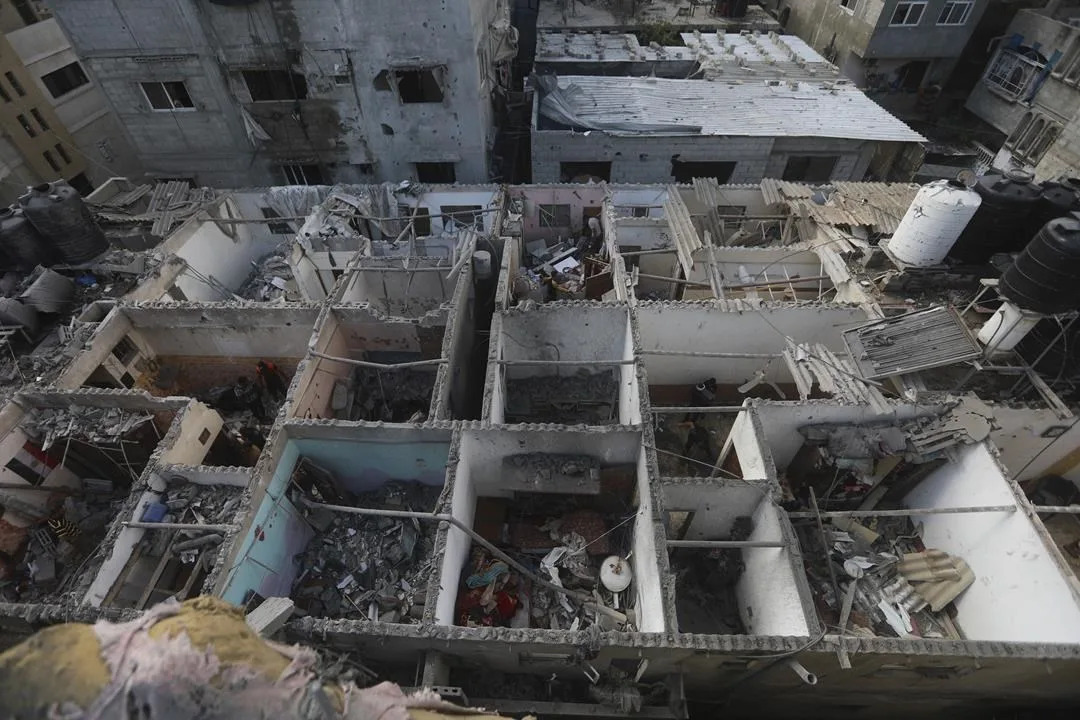
OTTAWA — Liberal ministers expressed disappointment and dismay Tuesday in response to Israel's invasion of the city of Rafah in the Gaza Strip — the last refuge for displaced Palestinians in the territory.
Canada's foreign minister rebuked Israel for its military operation in Rafah, but said she's holding out hope that ceasefire talks will prevail.
"An invasion of Rafah, which would endanger the lives of women and children and innocent civilians, is completely unacceptable," Foreign Affairs Minister Mélanie Joly told reporters on Parliament Hill.
Israeli officials announced Monday that the country approved a military operation into the border city began striking targets in the area.
The move came just hours after Hamas announced it had accepted an Egyptian-Qatari ceasefire proposal, which Israel says does not meet its essential demands.
The situation in the Palestinian territory is already catastrophic, and the vast majority of people in the city have already been displaced and have nowhere to go, Joly said.
She also said Canada is putting pressure on Israeli officials to stop the military operation.
The flow of humanitarian aid was halted when Israel seized control of the border Tuesday in what Israeli Prime Minister Benjamin Netanyahu called an "important step" toward dismantling Hamas’ military and economic capabilities.
About 1.3 million Palestinians — more than half of Gaza’s population — are jammed into Rafah and rely on aid that flows through border crossing.
"They're trapped there, no access to humanitarian aid, and this will cause a lot of civilian casualties," said International Development Minister Ahmed Hussen Tuesday. Canada has constantly advised against a military operation in Rafah, he said.
"We're very disappointed that it's happening."
Canada has already explored other options to get aid into the besieged territory, including contributing to a sea port and resorting to airdrops, Hussen said.
"We've done everything that we can," he said.
The border closure will also further complicate plans to get people with extended family ties to Canadians out of Gaza.
"It means we will not be able to get people out, and that’s an extreme concern to me," said Immigration Minister Marc Miller.
The government launched a temporary visa program to bring people to Canada to seek refuge with their Canadian families, but hasn't been able to facilitate their escape from the war zone through the already tightly-controlled Rafah border.
Some people have managed to get out on their own by giving huge sums of money to private firms to allow them through the crossing into Egypt.
People will likely continue to do whatever they have to do to get out, even in a militarized zone with their lives on the line, Miller said.
"It would be hard to speculate, but it sure will be harder, I would think," he said.
At a committee meeting last week, Canadian officials told senators they were hoping for a ceasefire that will allow for the delivery of aid to Gaza.
Experts advised, though, that Ottawa is in the tricky position of dealing with leaders who lack political incentives to end the conflict.
Ottawa's aid budget is helping to fund efforts to eventually bring in ample amounts of food that will undercut the black market in Gaza, said Karim Morcos, Global Affairs Canada's director for Israel and the Palestinian territories.
He said flour is so rare and expensive in the territory that delivering it prompts violence and theft.
"The strategy of the UN agencies is to flood the place with aid so that it becomes devalued," he testified last week at the Senate defence committee.
"What they are looking for is to basically take a soccer stadium and just fill it with aid, and have people serve themselves. That's the only way they can do it in the short term, where there is no civil order to protect those deliveries."
There are signs both Israelis and the Palestinians in Gaza are unhappy with their leaders, who can rely on the ongoing conflict to distract from their own unpopularity, said Janice Stein, a renowned foreign-policy analyst based at the University of Toronto's Munk School.
Polls show a majority of Israelis want Netanyahu to leave, and there are "cracks" between his coalition of nationalists and religious parties on issues such as Iran, she told the committee.
Palestinians are also expressing open anger at Hamas for exposing them to the war without thought for the civilian population, she said.
Gaza became a battlefield after Hamas launched an attack on Israel on Oct. 7, killing 1,200 Israeli civilians and military members.
The retaliatory siege, bombardments and ground attacks have left more than 30,000 Palestinians dead, health officials in the region said.
Stein warned time is running out to de-escalate the conflict, and "a high risk of escalation to a wider regional war" would "have catastrophic consequences for the civilian population."
This report by The Canadian Press was first published May 7, 2024.
— With files from The Associated Press.
Laura Osman and Dylan Robertson, The Canadian Press
Gaza war: Where has Israel told Rafah displaced to go?
David Gritten - BBC News
Tue, May 7, 2024
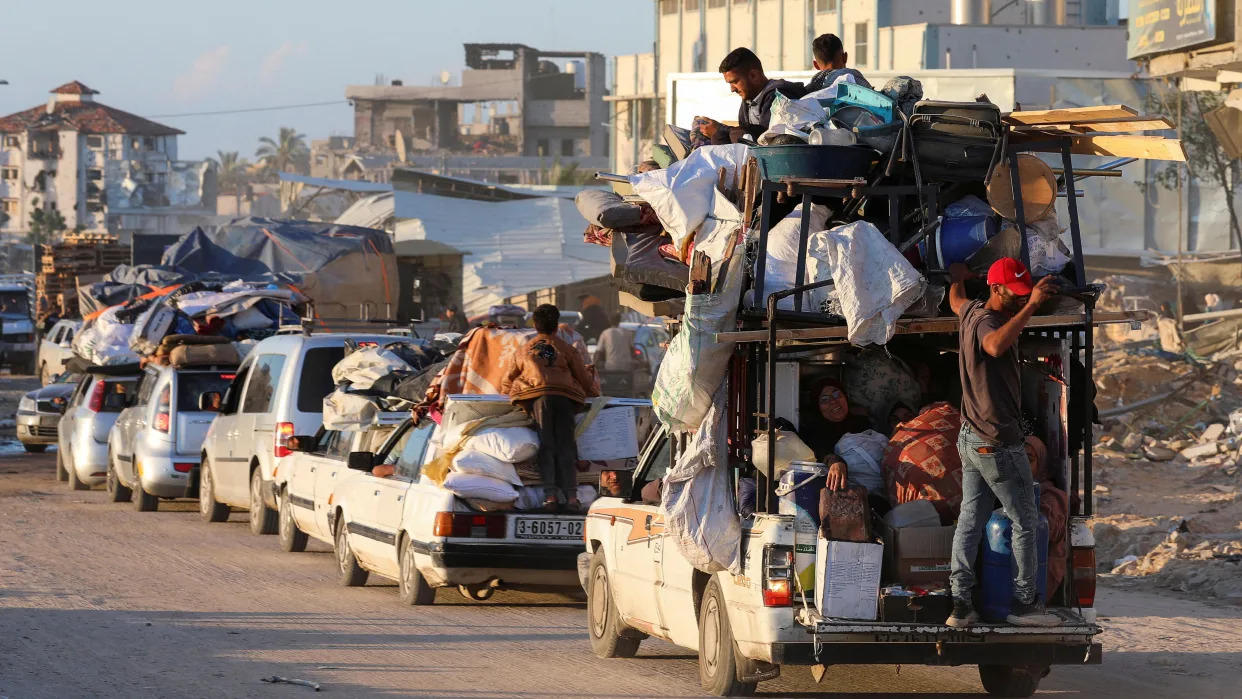
Some of those who fled eastern Rafah on Monday headed to the nearby city of Khan Younis [Reuters]
Many Palestinians are fleeing eastern parts of Rafah, after the Israeli military ordered their evacuation before starting an operation in the southern Gaza city.
On Monday the military told the tens of thousands of people affected to begin heading towards an “expanded humanitarian area" to the north, where it said they would find field hospitals, tents and basic supplies.
But Palestinians warned that the area was made up of neighbourhoods that were already overcrowded and lacking in essential services, were still coming under intense bombardment, or had been left in ruins by recent fighting.
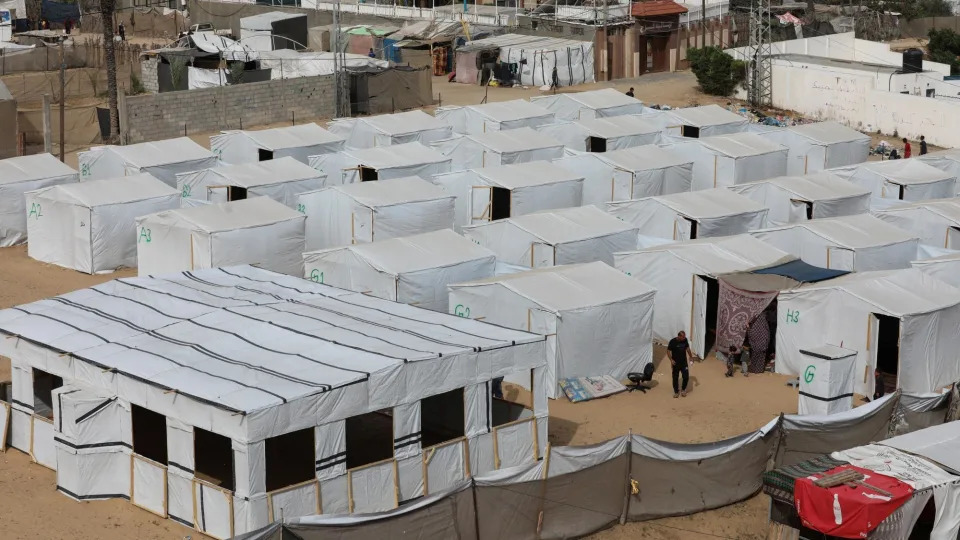
Several tented encampments have been set up north of Rafah in recent weeks [Reuters]
Almost seven months into its war against Hamas, senior Israeli government and military figures have insisted that victory is impossible without a full-scale ground assault on Rafah.
But Israel’s closest ally, the US, has said it has yet to see a credible plan to protect the more than a million displaced Palestinians sheltering there - half of them children.
In March, the Israel Defense Forces (IDF) said it was intending to evacuate most, if not all, of the civilians in Rafah ahead of major offensive and send them to “humanitarian islands” in central Gaza where aid and tents would be provided.
It appeared that plan was being at least partly put into action, when the IDF announced the evacuation of eastern Rafah and the “expansion of the humanitarian area” in nearby al-Mawasi as part of its preparations for ground operations there.
“This expanded humanitarian area includes field hospitals, tents and increased amounts of food, water, medication and additional supplies,” an IDF statement said.
An IDF spokesperson said the evacuation would be “gradual” and affect an estimated 100,000 residents and displaced people. However, a Palestinian Red Crescent official put the figure at 250,000 and a UN official said many others would be on the move because they feared this was only “the first phase in a longer operation”.
Israel takes Rafah crossing as truce talks continue
Israel orders Gazans to evacuate part of Rafah
Flyers dropped by Israeli aircraft over Rafah on Monday featured a map that identifies nine area blocks in south-eastern Rafah, including al-Shokat, al-Salam, al-Jneineh, Tabbet Zarei and al-Yarmouk, as well as open land around the Israeli-controlled Kerem Shalom and Egyptian-controlled Rafah border crossings.
The UN said the evacuation zone covered more than 30 sq km (12 sq miles) and was home to nine sites sheltering displaced people, as well as three clinics and six warehouses.
The flyer instructed all residents to evacuate immediately and head towards an approximately 60 sq km area stretching north along the Mediterranean coast from al-Mawasi - a narrow strip of agricultural land that has long been an IDF-designated “humanitarian zone” - to the city of Khan Younis and the central town of Deir al-Balah.
The IDF did not provide any details about the locations of the tents for the people being evacuated, but in recent weeks satellite images have shown several encampments constructed north of Rafah and west of Khan Younis.
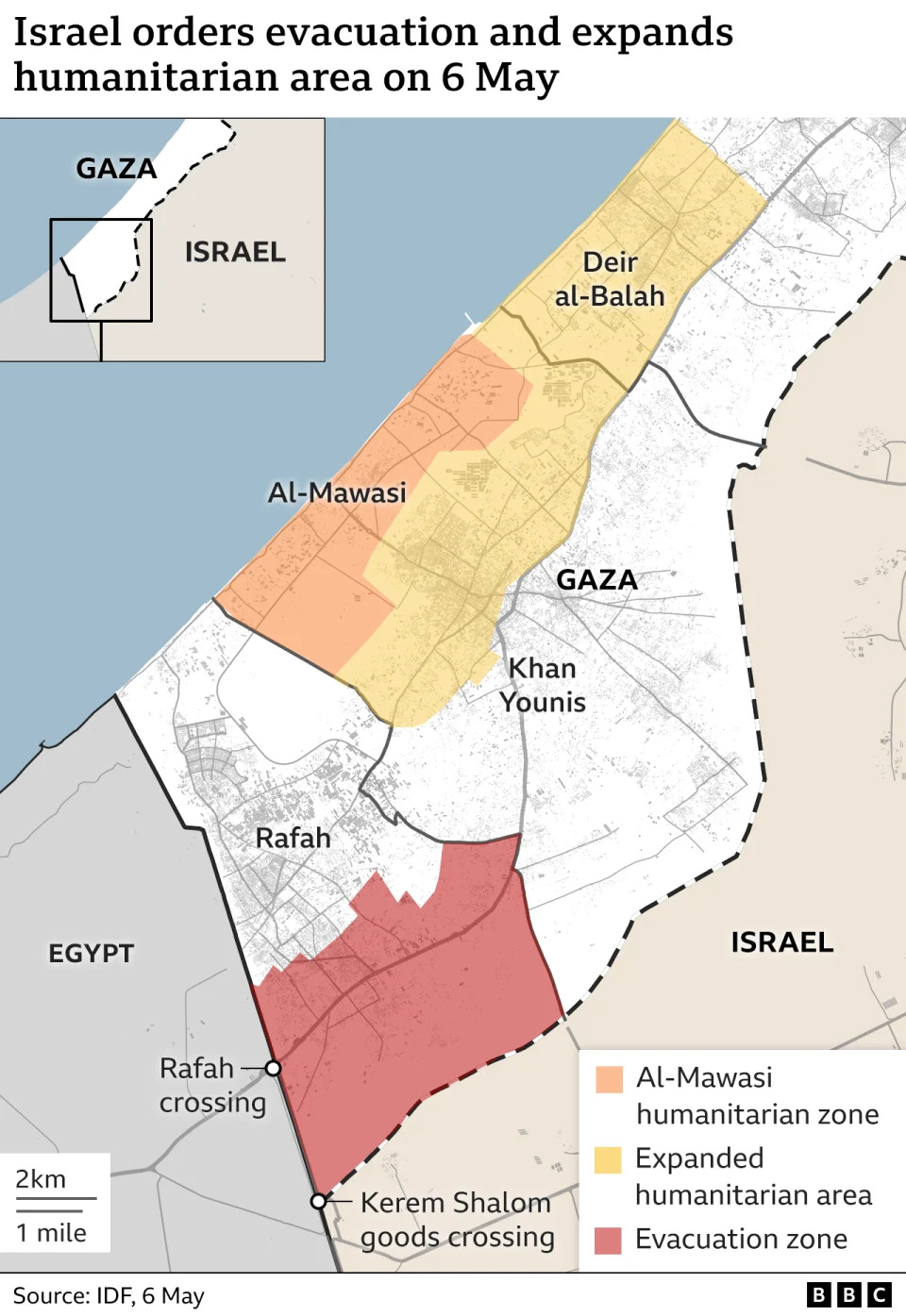
[BBC]
Mohammed Daoud said the 35 members of his family living had “no choice but to leave” after finding out that their house in the Oraiba area was inside the evacuation zone.
“We do not know where to go and how we will manage,” he told the BBC.
Rasha Sheikh Khalil, a displaced woman living in a tent in Rafah with her husband and four children, said: “I had started preparing my bags and getting ready to return to my neighbourhood in Gaza City, but the bad news [on Monday] surprised us.”
“No-one cares about our fate. For seven months we have not tasted comfort and tranquillity.”
Ghada el-Kurd, a mother-of-two who has been displaced six times over the last four months, told the BBC that she was living only 15 minutes away from one of the evacuated areas but was staying put for now.
“I’m so confused... I have no place to go. This was the last place I know,” she said.
“If I want to come back to Khan Younis there is no place - it is all destroyed. [As for] areas of al-Mawasi, they are crowded and I cannot any more live inside a tent - it’s so hot and my health does not allow me to be in such a situation. Regarding Deir al-Balah... there are a lot of air strikes there... and it is a very dangerous area.”
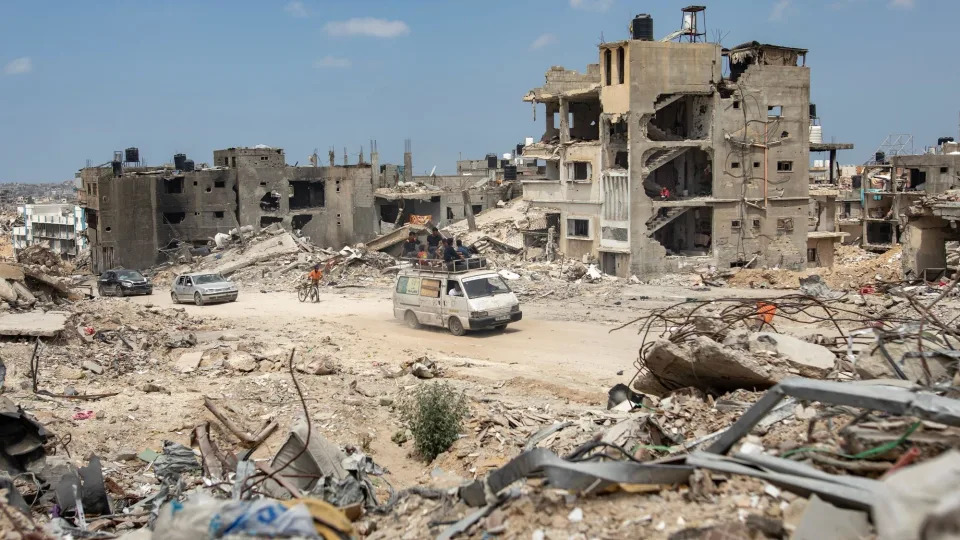
Researchers estimate that 50% of the buildings in Khan Younis are likely to be destroyed or damaged [EPA]
The UN said it was “not taking part in involuntary evacuations or in the setting up of any displacement zones”.
But James Elder, a spokesman for the UN children’s agency, Unicef, who was in Gaza last month, said Ghada el-Kurd’s assessment of the IDF’s humanitarian area was “absolutely spot on”.
"There's nowhere to go. Khan Younis, let's be clear, is rubble,” he told the BBC. “I've walked around those streets of Khan Younis. It's not a little bit destroyed, it's utterly devastated.”
“Deir al-Balah... has now got raw sewage running through the streets because sanitation has just been devastated, and al-Mawasi is a beach, a sandy area, and we're starting to hit summer.”
“We've already had reports of children dying of dehydration. So when we're told that people should move to humanitarian zones, that's a terrifying irony when humanitarians aren't working in these zones."
But, he added: “Of course, families will move. They will move because they will move or be bombed.”
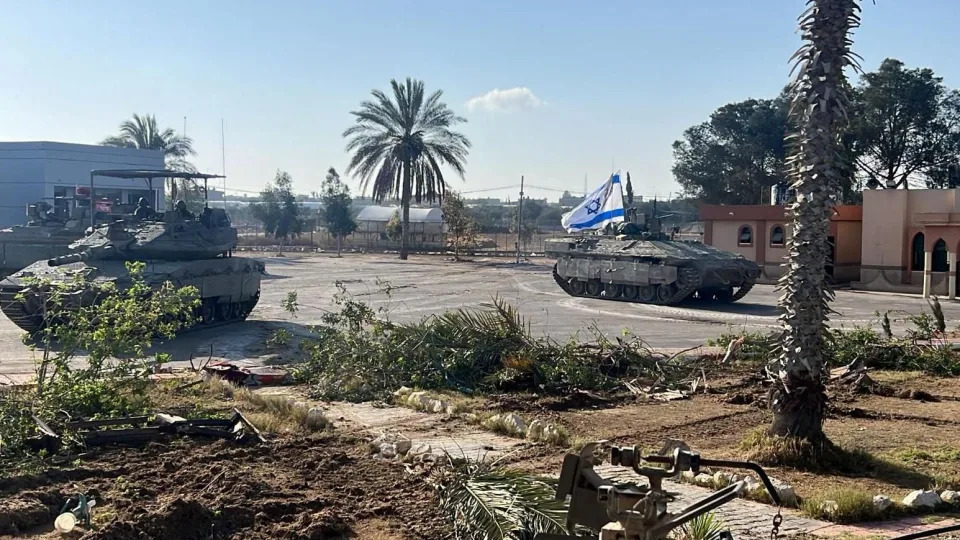
The Israeli military said it had taken control of the Rafah crossing a day after the evacuations began [Reuters]
Mr Elder said the aid operation in Gaza was already very fragile because it was “continually undermined by bombings, by insecurity, by denial of access”, but that an Israeli offensive in Rafah could push it to breaking point.
UN officials are particularly concerned that the Rafah and Kerem Shalom crossings - the key entry points for aid into Gaza - could be closed during the current Israeli operation in eastern Gaza.
Kerem Shalom was shut on Sunday after four Israeli soldiers there were killed by 10 rockets launched by Hamas fighters from an area near the Rafah crossing, according to the IDF. But Israel’s prime minister told the US president on Monday that he would ensure Kerem Shalom reopened for humanitarian assistance.
Kerem Shalom was still closed on Tuesday morning, when the IDF announced that its troops had "obtained operational control" of the Gazan side of the Rafah crossing.
The UN agency for Palestinian refugees, Unrwa - which runs the largest humanitarian operation in Gaza - has said it will maintain a presence in Rafah as long as possible and would continue providing lifesaving aid.
But it has also warned that the continued interruption of the entry of aid and fuel supplies at the Rafah crossing would "halt the critical humanitarian response" across Gaza.
"The catastrophic hunger faced by people especially in northern Gaza will get much worse if these supply routes are interrupted," the agency said in a post on X, formerly Twitter, on Tuesday.
The IDF has said it is committed to facilitating humanitarian aid into and within Gaza and that it has established alternative crossings, including two in the north.
Why is Rafah important in the Israel-Gaza conflict? Israeli military take Rafah
Tamara Davison,Ayan Omar,Sian Baldwin and Nuray Bulbul
Tue, May 7, 2024
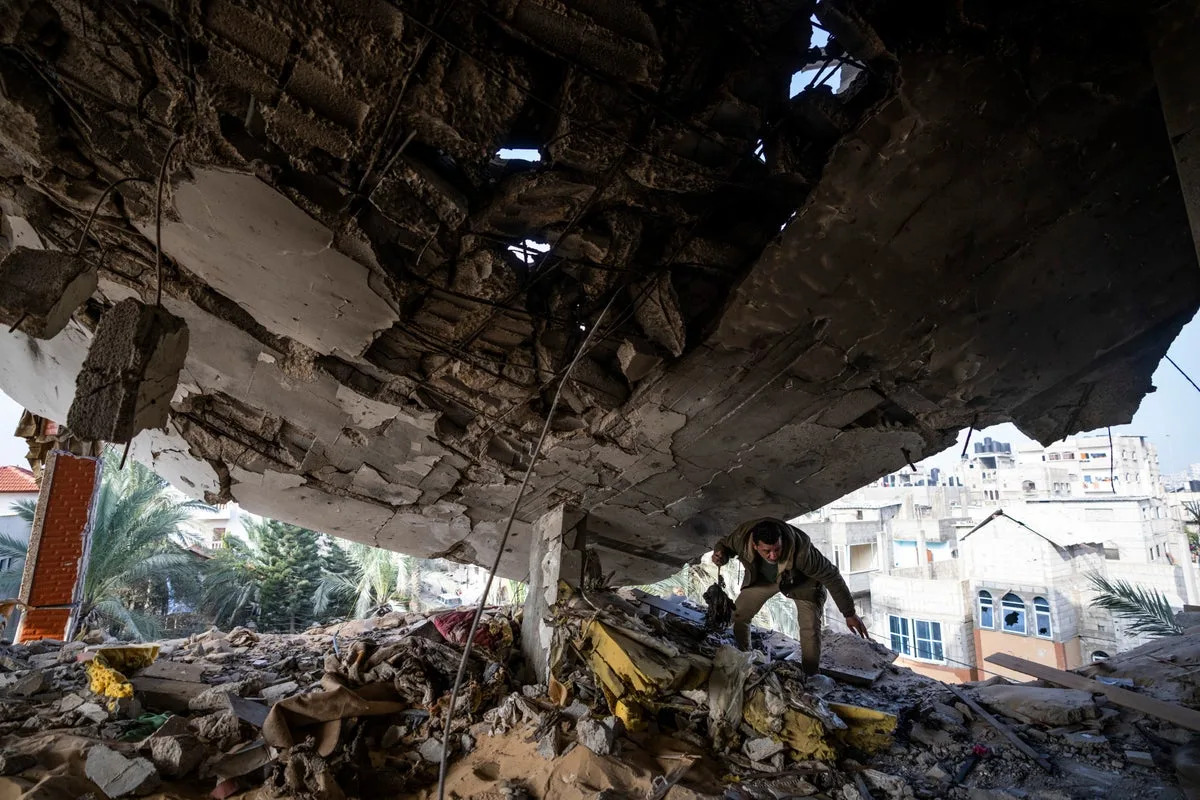
Why is Rafah important in the Israel-Gaza conflict? Israeli military take Rafah
Following a night of airstrikes on the Palestinian enclave, the Israeli military took control of the Rafah border crossing between the Gaza Strip and Egypt on Tuesday. Its tanks then advanced into the southern Gazan town of Rafah.
The Israeli onslaught began as the conflict entered its eighth month, with peace brokers failing to determine a ceasefire between Israel and its adversaries in Hamas.
The militant Palestinian group announced late on Monday that it had accepted a proposal for a truce, but Israel claimed the terms did not satisfy its demands.
Israeli tanks and jets attacked multiple locations and homes in Rafah during the night, sparking alarm from around the world over the condition of the population trapped in the area.
More than 33,000 Palestinians have been massacred in the past six months by Israel, including 13,800 children.
Israel’s prime minister Benjamin Netanyahu faces increasing pressure from the international community to call off any attack on Rafah, where around 1.5 million displaced Gazans are currently sheltering.
Earlier this year, a spokesperson for Rishi Sunak said he was “deeply concerned” about a Rafah attack, while Foreign Minister David Cameron said it was “impossible to see how you can fight a war amongst these people, there is nowhere for them to go”.
Despite this, Cameron also maintained this week that the UK would continue selling arms to Israel.
Since Israel’s bombardment of Occupied Palestinian Territories began in October, the population in Rafah has hugely increased.
Israel has continuously forced Palestinian civilians toward the city, deeming it a “safe zone”. However, Israeli strikes have continued to kill Palestinians seeking refuge there, prompting international alarm about an imminent ground offensive.
Rafah is located along the border of Egypt’s Sinai Peninsula and is currently one of the most densely populated places on Earth.
Despite mounting concern for the city’s inhabitants, of whom 600,000 are reportedly children, Netanyahu appears determined to push ahead with the offensive.
Palestinian civilians reportedly have nowhere left to go, and Israel has so far proposed no evacuation plan to help families desperately trying to escape the conflict.
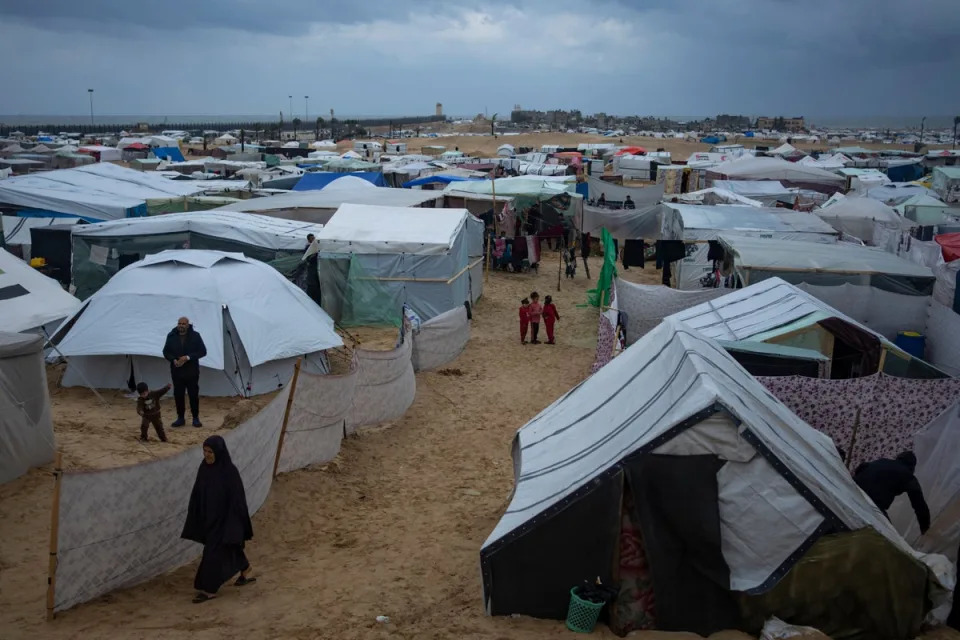
Palestinians displaced by the Israeli air and ground offensive on the Gaza Strip walk through a makeshift tent camp in Rafah (AP)
Why is Rafah important?
Located next to Egypt, Rafah was previously one of the last borders in operation in the Occupied Palestinian territories and the only way that Palestinians could leave the Gaza Strip. The border remains tentatively closed, meaning most Palestinians cannot leave and most humanitarian aid cannot get in.
Israel controls all sea and other land borders across the Palestinian Territories. Reports have shown Israeli protesters attempting to block humanitarian aid passing into Gaza.
Foreign aid groups – which have also been targeted by Israeli attacks in a break of international humanitarian law – warn that the Gaza Strip is facing a serious famine.
Rafah is now one of the last major cities in which Israeli forces are yet to enter as part of their six-month “operation” to eradicate Hamas fighters. However, that is expected to change very soon.
The city has transformed into a mass refugee camp, with more than a million distressed people fleeing other parts of the Gaza Strip to seek refuge from intense Israeli bombing.
Shelling across Rafah has already turned many buildings into rubble, killing hundreds of Palestinians.
Food and clean water remain scarce, prompting major concerns about a mounting regional humanitarian crisis.
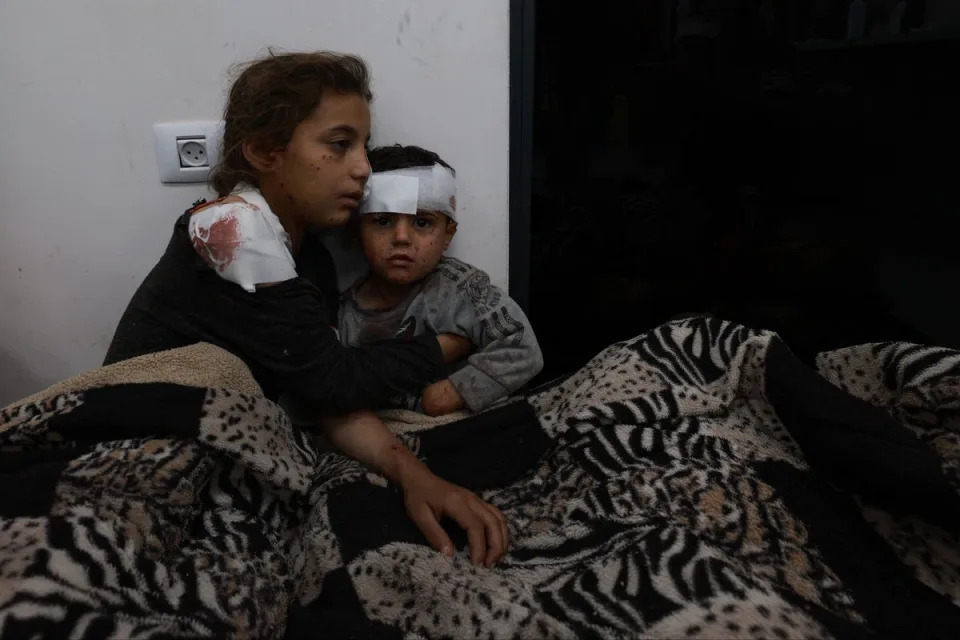
Wounded Palestinian girl Somay al-Najar comforts her brother Yamen (AFP via Getty Images)
All eyes are now on Rafah, as Netanyahu has pressed on with a ground offensive – despite international condemnation of such a move. US President Joe Biden had joined calls to halt a Rafah offensive.
UN human rights high commissioner Volker Türk previously warned that Israel’s offensive in Rafah would be "terrifying, given the prospect that an extremely high number of civilians, again mostly children and women, will likely be killed and injured".
What happens in Rafah is important as it may demonstrate how far Israel is prepared to go in ignoring calls from the international community. A ground offensive in Rafah may also lead to further instability in the Middle East and threaten key regional peace agreements.
Having so far failed to keep Palestinian civilians safe, according to some reports, Israel is in breach of International Court of Justice orders.
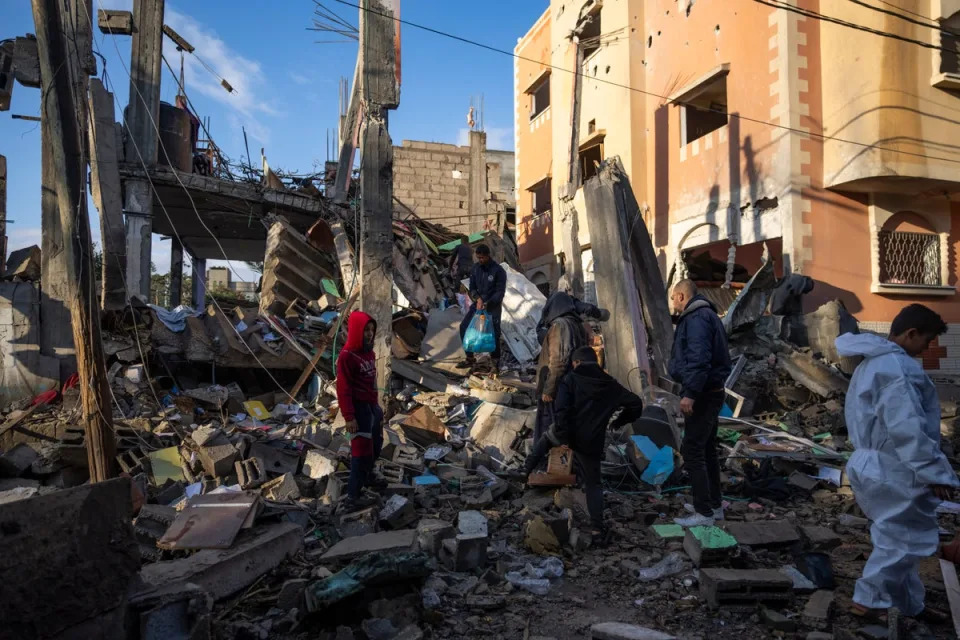
Palestinians look at the destruction after an Israeli strike in Rafah in the southern Gaza Strip (AP)
Is Rafah a safe zone?
Rafah was previously considered a safe zone in the Gaza Strip and displaced Palestinians had been told by Israel to head south towards it.
In December, for example, Israel reportedly dropped leaflets over civilian homes in Khan Younis, a city in the southern Gaza Strip, saying: “To the residents of the towns of Al-Qarara, Khuza’a, Abasan, and Bani Suhaila, you must evacuate immediately and go to shelters in the Rafah area.”
Most Palestinians, having witnessed attacks carried out in other parts of Gaza, adhered to the guidance and fled there.
Will Egypt let Palestinians in?
Egypt has served as a mediator between Hamas and Israeli leaders, recently hosting further ceasefire talks in Cairo.
Analysts have suggested that by pushing Palestinians south, Israel could eventually aim to force them to leave Gaza and enter Egypt’s Sinai Peninsula.
An Israeli concept paper released on October 8, 2023, suggested as much, detailing plans to transfer the population of the Gaza Strip into Egypt.
However, Egyptian officials are against the idea of allowing Palestinians into the arid Sinai desert. They argue that Israel will never allow Palestinian people to return to their land – further prompting instability in the Middle East.
However, Egypt is reportedly building a walled camp in the Sinai Peninsula to receive displaced Palestinians fleeing Gaza.
The Wall Street Journal reported that Egypt was constructing an “eight-square-mile walled enclosure” on its side of the border with Gaza.
The Sinai Foundation for Human Rights (SFHR) has posted photos and videos of construction under way around the Egyptian side of the Rafah crossing.
The SFHR said the enclosure was intended to house the refugees in case of a mass exodus. However, the governor of North Sinai, Major General Mohamed Shousha, rejected the claims that Egypt was developing "an isolated area in Sinai" for refugees.
Israel seizes Gaza's vital Rafah crossing, but the US says it isn't the full invasion many fear
SAMY MAGDY, MELANIE LIDMAN and LEE KEATH
Updated Tue, May 7, 2024
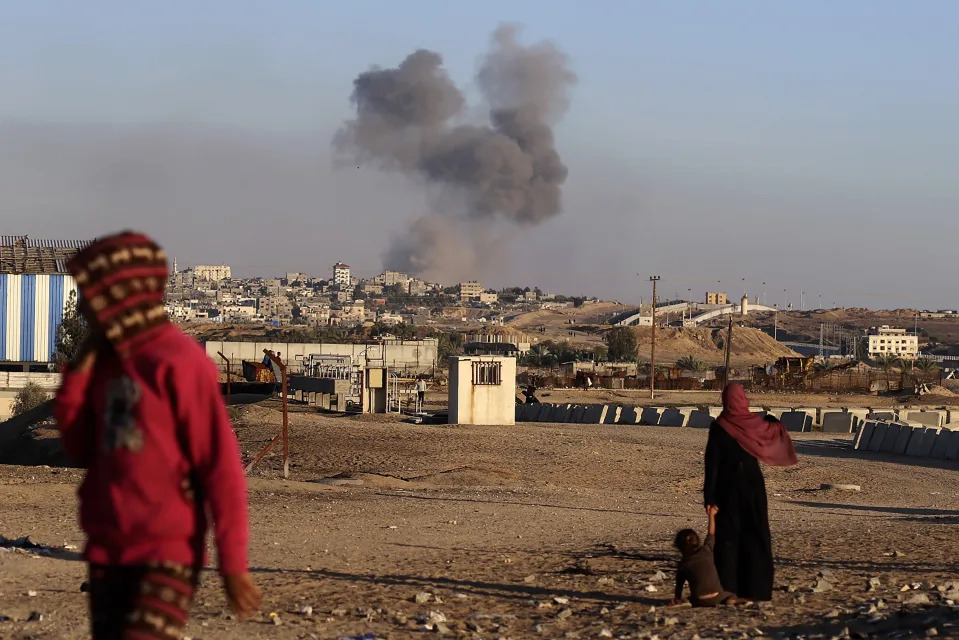
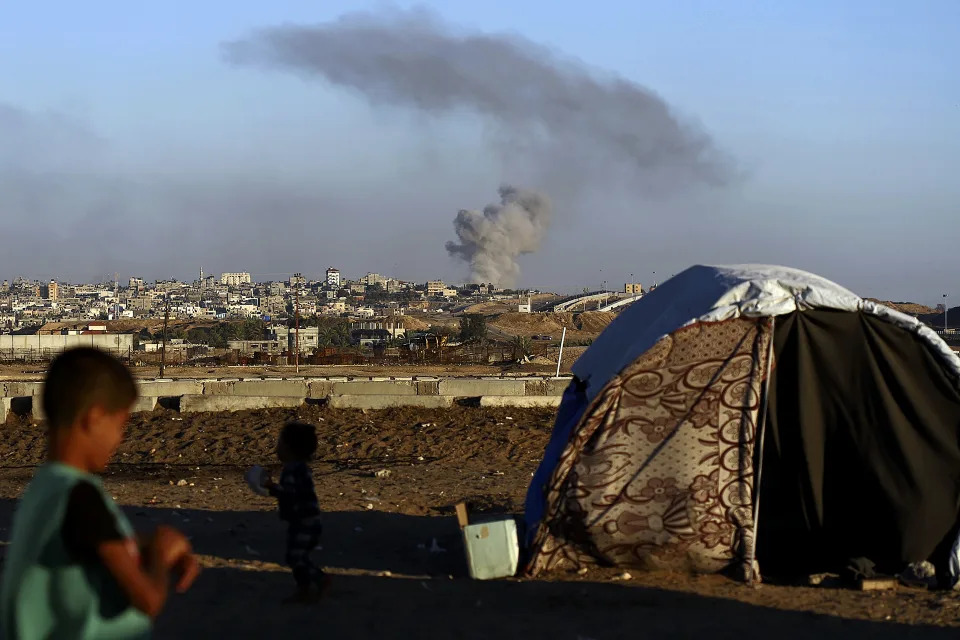
APTOPIX Israel Palestinians
CAIRO (AP) — Israeli troops seized control of Gaza’s vital Rafah border crossing on Tuesday in what the White House described as a limited operation, as fears mount of a full-scale invasion of the southern city and talks with Hamas over a cease-fire and hostage release remain on a knife’s edge.
The U.N. warned of a potential collapse of the flow of aid to Palestinians from the closure the Rafah crossing from Egypt and the other main crossing into Gaza, Kerem Shalom, from Israel, at a time when U.N. officials say northern Gaza is experiencing “full-blown famine.”
The Israeli foray overnight came after hours of whiplash in the now 7-month-old Israel-Hamas war, with the militant group saying Monday it accepted a cease-fire proposal that Israel insisted fell short of its own core demands.
The high-stakes diplomatic moves and military brinkmanship left a glimmer of hope alive for a deal to bring at least a pause in the war, which has killed more than 34,700 Palestinians, according to local health officials, and has devastated the Gaza Strip.
The Rafah and Kerem Shalom crossings are critical entry points for food, medicine and other supplies for Gaza’s 2.3 million people. They have been closed for at least the past two days, though the smaller Erez crossing between Israel and northern Gaza continues to operate.
By capturing the Rafah crossing, Israel gained full control over the entry and exit of people and goods for the first time since it withdrew soldiers and settlers from Gaza in 2005, though it has long maintained a blockade of the coastal enclave in cooperation with Egypt.
Israeli Prime Minister Benjamin Netanyahu called the capture of the crossing an “important step” toward dismantling Hamas' military and governing capabilities, and Defense Minister Yoav Gallant said Israel would “deepen” the Rafah operation if talks on the hostage deal failed.
Osama Hamdan, a Hamas official based in Beirut, said the militant group would not respond to military pressure or threats and would not accept any “occupying force” at the Rafah crossing.
White House National Security Council spokesman John Kirby said the operation along the Gaza-Egypt border in eastern Rafah was not a full-on Israeli invasion of the city that President Joe Biden has repeatedly warned against on humanitarian grounds. Kirby said Israel described it as “an operation of limited scale and duration” aimed at cutting off Hamas arms smuggling.
Kirby also expressed optimism about the negotiations, saying Israel and Hamas “should be able to close the remaining gaps” to complete an agreement. He said CIA chief William Burns will attend further talks in Cairo with representatives from Israel, Egypt and Qatar. Hamas also sent a delegation to Cairo, which will meet separately with the Arab mediators.
“Everybody is coming to the table,” Kirby said.
Fighting forced the evacuation of the Abu Youssef al-Najjar Hospital, one of the main medical centers receiving people wounded in airstrikes on Rafah in recent weeks. It was not immediately clear how many patients were moved to other facilities.
The looming operation threatens to widen a rift between Israel and its main backer, the United States, which says it is concerned over the fate of around 1.3 million Palestinians crammed into Rafah, most of whom fled fighting elsewhere.
Biden warned Netanyahu again Monday against launching an invasion of the city after Israel ordered 100,000 Palestinians to evacuate parts of Rafah. But Netanyahu's far-right coalition partners have threatened to bring down his government if he calls off an offensive or makes too many concessions in cease-fire talks.
Palestinians' cheers of joy over Hamas' acceptance of the cease-fire deal turned to fear Tuesday. Families fled Rafah's eastern neighborhoods on foot or in vehicles and donkey carts piled with mattresses and supplies. Children watched as parents disassembled tents in the sprawling camps that have filled Rafah for months to move to their next destination — which for many remained uncertain.
“Netanyahu only cares about coming out on top. He doesn't care about children. I don't think he'll agree” to a deal, said Najwa al-Saksuk as her family packed up while Israeli strikes rang out amid plumes of black smoke.
Families of the Israeli hostages also saw their hope turn to despair. Rotem Cooper, whose 85-year-old father, Amiram, was among scores abducted during Hamas' Oct. 7 attack, slammed what he said was the government’s inaction on a deal.
“We see all sorts of explanations — ‘This isn’t the deal that we gave them, Hamas changed it without saying something,’” Cooper said at a parliamentary hearing Tuesday. He questioned whether military pressure was an effective bargaining tactic.
Israel's 401st Brigade took “operational control” of the Gaza side of the Rafah crossing early Tuesday, the military said. Military footage showed Israeli flags flying from tanks in the area. It also said troops and airstrikes targeted suspected Hamas positions in Rafah.
The military claimed it had intelligence the crossing was “being used for terrorist purposes,” though it did not immediately provide evidence. It said Hamas fighters near the crossing launched a mortar attack that killed four Israeli troops near Kerem Shalom on Sunday and that more mortars and rockets were fired from the area Tuesday.
Israeli authorities denied the U.N. humanitarian affairs office access to the Rafah crossing Tuesday, said its spokesman, Jens Laerke. All fuel for aid trucks and generators comes through Rafah, and Laerke said there was a “very, very short buffer of about one day of fuel."
Israeli strikes and bombardment across Rafah overnight killed at least 23 Palestinians, including at least six women and five children, according to hospital records.
Mohamed Abu Amra said his wife, two brothers, sister and niece were killed when a strike flattened their home as they slept. “We did nothing. ... We don’t have Hamas,” he said.
Egypt’s Foreign Ministry condemned the seizure of the Rafah crossing, calling it “a dangerous escalation.”
It has previously warned that any occupation of Rafah — which is supposed to be part of a demilitarized border zone — or an attack that forces Palestinians to flee into Egypt would threaten the 1979 peace treaty with Israel that’s been a linchpin for regional security.
Netanyahu has said an offensive to take Rafah — which Israel calls Hamas' last major stronghold in Gaza — is crucial to destroying Hamas after its October attack on southern Israel that triggered the war. Hamas and other militants killed some 1,200 people, mostly civilians, and took around 250 hostages.
The United States, Egypt and Qatar have spent months trying to broker a cease-fire agreement and the release of the estimated 100 hostages and remains of 30 others still held by Hamas, which insists it will not release them unless Israel ends the war and withdraws from Gaza.
Netanyahu and other top officials have publicly rejected those demands, saying they plan to launch the offensive after any hostage release and continue until Hamas is destroyed. For now, the hostages serve as Hamas' strongest bargaining chip and potential human shields for its leaders.
An Egyptian official and a Western diplomat said the draft Hamas accepted had only minor changes in wording from a version the U.S. had earlier pushed for with Israeli approval. The changes were made in consultation with the CIA chief, who embraced the draft before sending it to Hamas, they said, speaking on condition of anonymity to discuss the deliberations.
According to a copy released by Hamas, the proposal outlines a phased release of hostages alongside gradual withdrawal of Israeli troops from Gaza and ending with a “sustainable calm,” defined as a “permanent cessation of military and hostile operations.”
___
Lidman reported from Jerusalem. Associated Press journalists Aamer Madhani in Washington, Ashraf Sweilam in el-Arish, Egypt, and Abby Sewell in Beirut contributed to this report.
Gaza aid choked off after Israeli forces seize crossing
Reuters Videos
Updated Tue, May 7, 2024
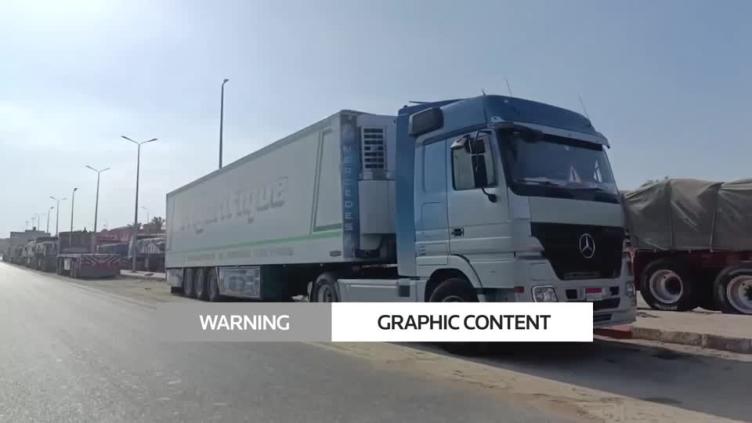
STORY: Aid trucks were seen lined up on the road in Egypt’s Rafah on Tuesday after Israel took control of the Palestinian side of the main border crossing.
The United Nations and other international aid agencies said the closing of the two crossings into southern Gaza – Rafah and Israeli-controlled Kerem Shalom – had virtually cut off the already-devastated enclave from outside aid.
The seizure of the Rafah crossing, where more than 1 million displaced Palestinian civilians are holed up, came despite weeks of calls from the U.S. and others for Israel to hold off from a big offensive in Rafah.
Fedaa Shallah, a displaced Palestinian woman from Gaza City said, “I don’t see that there is any place that is safe. There is bombing, shelling and we’ve had enough.”
Doctor Mohammad Abu Skhil works in the emergency department of the Kuwaiti Hospital in Rafah.
"The closure of the Rafah Crossing will contribute further to the demise of the health situation in Gaza Strip, specifically in the city of Rafah because it is through the Rafah crossing that essential medical supplies needed for the healthcare in Gaza come in.”
The crossing was also the only exit point for those needing to leave Gaza for medical treatment unavailable inside the enclave.
United Nations Secretary General Antonio Guterres appealed to Israel and Hamas on Tuesday to spare no effort in arriving at a truce deal.
“Make no mistake – a full-scale assault on Rafah would be a human catastrophe. Countless more civilian casualties. Countless more families forced to flee yet again – with nowhere safe to go.”
Israeli Prime Minister Benjamin Netanyahu said seizing the crossing was a significant step towards its aim of destroying Hamas' military capabilities.
Hamas accused Israel of trying to undermine efforts to secure a ceasefire in the seven-month-long war...
which started when Hamas militants attacked Israel on Oct. 7, killing about 1,200 people and abducting about 250 others, according to Israeli tallies.
Around 35,000 Palestinians, most of them civilians, have been killed in Israeli strikes since, the Gaza Health Ministry said.
Any truce would be the first pause in fighting since a week-long ceasefire in November.
US scrambles to salvage cease-fire talks as Israel chokes off Rafah
Laura Kelly
Tue, May 7, 2024
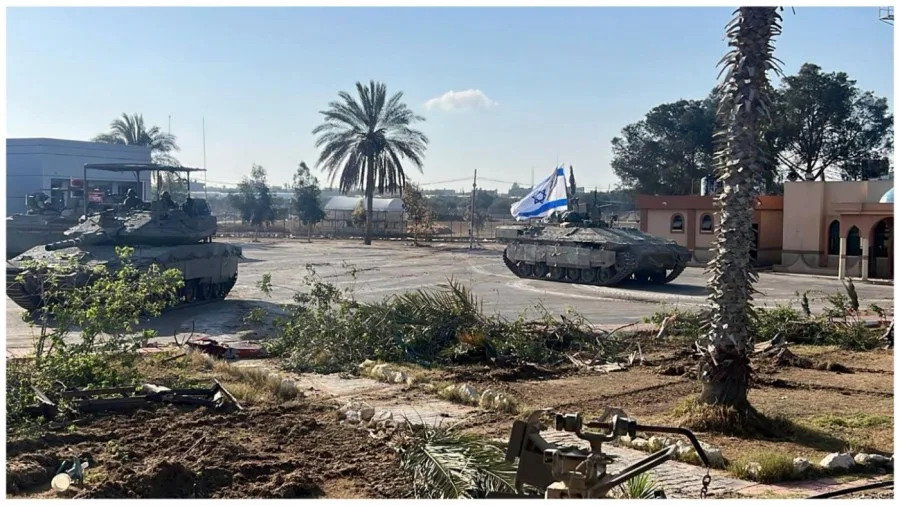
US scrambles to salvage cease-fire talks as Israel chokes off Rafah
The White House on Tuesday pushed to finalize a cease-fire agreement that would pause fighting in Gaza, even as Israel carried out a limited military operation to take control of a key border crossing into Rafah.
The U.S., along with Egypt and Qatar, has worked for weeks on a truce proposal between Israel and Hamas that would secure the release of Israeli hostages. And while Hamas on Monday said it had accepted an offer for a temporary cease-fire, Israel said the group’s terms fell short of its core demands.
Israeli Prime Minister Benjamin Netanyahu is laying down a high-stakes bet that launching military operations on the southern Gazan city of Rafah will increase pressure on Hamas.
“We understand that the time is running out for the life of the hostages,” said Israel Ziv, former commander of the Gaza Division and former head of the Israeli Operations Directorate, in a call with reporters Tuesday morning.
“The first priority is to maximize the option for the deal … that is what the maximum pressure is about,” he continued.
White House national security communications adviser John Kirby told reporters Tuesday the U.S. was closely monitoring Israel’s actions in Rafah, though he indicated it did not rise to the level of a full-scale military operation that U.S. officials had warned against. The operation, Kirby said, was aimed at cutting off Hamas’s ability to ship arms across the border into Rafah.
“How they’ve described this is not of a size, scale, duration and scope that one could equate to a major ground operation. But again, it’s just started,” Kirby said. “The president was very clear yesterday about his consistent concerns on that. So we’re going to keep watching it.”
“We don’t support operations in Rafah that put at greater risk the 1.5 million people that are seeking refuge there,” he added.
Israel Defense Minister Yoav Gallant said Tuesday Israeli forces were prepared to deepen its operation in Gaza if cease-fire talks fell through, a sign of the precarious state of play in the region.
CIA Director Bill Burns, who has led U.S. efforts in the talks, reportedly arrived Tuesday in Cairo, along with delegations from Israel, Hamas, Egypt and Qatar. The U.S. and Israel do not engage directly with Hamas, which is a U.S.-designated terrorist group.
Kirby told reporters the U.S. was optimistic the delegations could hammer out remaining differences over the cease-fire agreement.
“Our understanding of the text is they should be able to close these gaps, and hopefully very, very soon,” Kirby said.
“I really don’t want to get into talking about the specific parameters,” Kirby added. “At this very delicate stage, at a very sensitive time in where we are with the negotiations, I think it’s best to let the negotiators hammer out the existing gaps.”
The White House has for months tried to secure a cease-fire agreement in Gaza that would free hostages taken by Hamas during the attack in Israel last October, while also allowing more humanitarian aid to get into Gaza, where more than 34,000 Palestinians have been killed and tens of thousands more are without adequate food, water and medicine.
President Biden has grown frustrated with Netanyahu in recent months, even suggesting the U.S. could reassess its support for Israel if it did not do more to protect civilians and aid workers in Gaza.
While the Biden administration reportedly paused a shipment of ammunition to Israel, the reason for doing so remains unclear. A national security supplemental package Biden signed into law last month provides nearly $27 billion in military assistance related to Israeli and U.S. security needs.
Biden has sought to balance his vow to support Israel with public warnings that Netanyahu needs to change his approach. On Tuesday, he sought to underscore that he would not abandon Israel, even amid friction between the two.
“My commitment to the safety of the Jewish people, the security of Israel and its right to exist as an independent Jewish state is ironclad, even when we disagree,” Biden said in a speech condemning antisemitism at the U.S. Capitol.
Israel estimates there are 133 Israeli hostages in Gaza, but it’s unclear how many remain alive or in Hamas control. While Israel has called for 40 of the most vulnerable hostages — children, women, the elderly and wounded — to be evacuated in the first phase of a deal, Jerusalem said Hamas negotiators have indicated they can barely reach that number.
The main difference in demands between Israel and Hamas appear to be centered on the length of the pause in fighting — Hamas is demanding the cease-fire leading to an end to the war; Israel’s war aims are to eliminate Hamas’s ability to rule Gaza.
Other sticking points are Hamas’s demands to name the Palestinian prisoners it wants released from Israeli jails, while Israel wants control over the list; and the number of days for a cease-fire related to the number of people released by each side.
Soon after Hamas’s announcement of accepting a cease-fire deal, the Israeli war Cabinet on Monday night voted unanimously to proceed with what it describes as a limited operation on Rafah while keeping negotiations for a hostage release and cease-fire alive.
The Israeli military said it carried out airstrikes on eastern Rafah and seized the border crossing with Egypt on Monday night, after sending alerts through text, flyers and phone calls to an estimated 100,000 Palestinians to evacuate the area of expected conflict.
The operation was launched despite warnings from Biden to Netanyahu in a phone call Monday morning Eastern time. Biden has long warned Netanyahu against launching an operation in Rafah absent a credible plan to protect civilians, with more than 1 million displaced Palestinians sheltering in the city.
The Rafah crossing with Egypt is a main artery for humanitarian aid being brought into Gaza and an exit for Palestinians able to leave. Hostages released by Hamas during a weeklong cease-fire in November were transferred through the Rafah crossing.
United Nations Secretary-General António Guterres, amplifying alarm from aid groups, called for Israel to deescalate around Rafah, calling a full-scale assault on the southern city “a human catastrophe.”
“Rafah is the epicenter of humanitarian operations in Gaza. Attacking Rafah will further upend our efforts to support people in dire humanitarian straits as famine looms,” Guterres said.
“Even the best friends of Israel are clear: An assault on Rafah would be a strategic mistake, a political calamity, and a humanitarian nightmare.”
Ziv, the retired Israeli general, described the Israeli government’s thinking on seizing the Rafah crossing as sending a clear message to Hamas.
“Rafah passage, this is the main strategic passage to the Gaza Strip, and of course by holding that, it’s kind of holding the airway for Gaza by Israel,” he said.
“This is supposed to give the Hamas a clear understanding that Israel has the main key.”
US believes Hamas, Israel can break Gaza ceasefire impasse; Israeli forces cut Rafah aid route
Updated Tue, May 7, 2024
By Mohammad Salem and Nidal al-Mughrabi
RAFAH, Gaza Strip/CAIRO -The U.S. said negotiations on a Gaza ceasefire should be able to close the gaps between Israel and Hamas while Israeli forces seized the main border crossing in Rafah on Tuesday, closing a vital route for aid.
Hamas official Osama Hamdan, speaking to reporters in Beirut, warned that if Israel's military aggression continued in Rafah, there would be no truce agreement.
The Palestinian militant group accused Israel of undermining ceasefire efforts in the seven-month-long war that has laid waste to Gaza and left hundreds of thousands of its people homeless and hungry.
The truce comments came as Israel invaded Rafah, a southern Gazan city where more than one million displaced Palestinian civilians have sought shelter from Israel's offensive throughout the tiny territory.
White House spokesperson John Kirby said Hamas offered amendments on Monday to an Israeli proposal aimed at ending the impasse. The deal text, as amended, suggests the remaining gaps can "absolutely be closed," he said. He declined to specify what those were.
Israel on Monday said a three-phase proposal that Hamas approved was unacceptable.
Kirby said mediators from Qatar and Egypt along with U.S. and Israeli officials were gathering in Cairo. Hamas separately said its delegation was in Cairo as well.
OFFENSIVE
Israel's seizure of the Rafah crossing came despite weeks of calls that the U.S., other nations and international bodies hoped would deter a big offensive in the Rafah area - which Israel says is Hamas fighters' last stronghold.
Israeli army footage showed tanks rolling through the Rafah crossing complex between Gaza and Egypt, and the Israeli flag raised on the Gaza side.
Israeli Prime Minister Benjamin Netanyahu said seizing the crossing was a "very significant step" toward Israel's stated aim of destroying Hamas's military capabilities.
Residents reported heavy tank shelling on Tuesday evening in some areas of eastern Rafah. A Rafah municipal building caught fire after Israeli shelling, residents and Hamas media said. Medics said one Palestinian was killed and several wounded in the building while an Israeli strike also killed two Palestinians on a motorcycle.
Health officials said Abu Yousef Al-Najar, the main hospital in Rafah, closed on Tuesday after heavy bombardment nearby led medical staff and around 200 patients to flee.
"They have gone crazy. Tanks are firing shells and smoke bombs cover the skies," said Emad Joudat, 55, a Gaza City resident displaced in Rafah.
"I am now seriously thinking of heading north, maybe to the central Gaza area. If they move further into Rafah, it will be the mother of massacres," he told Reuters via a chat app.
Many of those in Rafah were previously displaced from other parts of Gaza following Israel's orders to evacuate from there.
Families have been crammed into tented camps and makeshift shelters, suffering from shortages of food, water, medicine and other essentials.
The U.N. and other international aid agencies said the closing of the two crossings into southern Gaza - Rafah and Israeli-controlled Kerem Shalom - had virtually cut the enclave off from outside aid and very few stores were available inside.
Red Crescent sources in Egypt said shipments had completely halted. "These crossings are a lifeline... They need to be reopened without any delay," Philippe Lazzarini, head of U.N. aid agency UNRWA, said on X.
Separately, Jordan said Israeli settlers attacked a humanitarian convoy on its way to a crossing in northern Gaza.
The White House said it had been told the Kerem Shalom crossing would re-open on Wednesday and fuel deliveries through Rafah would resume then too.
U.N. Secretary-General Antonio Guterres appealed to Israel and Hamas to spare no effort to get a truce deal. "Make no mistake – a full-scale assault on Rafah would be a human catastrophe," Guterres said.
'PANIC AND DESPAIR'
Israel's military said it was conducting a limited operation in Rafah to kill fighters and dismantle infrastructure used by Hamas, which runs Gaza. It told civilians to go to what it calls an "expanded humanitarian zone" some 20 km (12 miles) away.
In Geneva, U.N. humanitarian office spokesperson Jens Laerke said "panic and despair" were gripping the people in Rafah.
Civilians did not have enough time to prepare for evacuation and no safe route to travel, he said. The roads are "littered with unexploded ordnance, massive bombs lying in the street. It's not safe," he said.
Critics of the Gaza war have urged U.S. President Joe Biden to pressure Israel to change course. The U.S., Israeli's closest ally and main weapons supplier, has delayed some arms shipments to Israel for two weeks, according to four sources on Tuesday.
The White House and Pentagon declined comment, but this would be the first such delay since the Biden administration offered its full support to Israel after Hamas' Oct. 7 attack.
Israel's offensive has killed 34,789 Palestinians, most of them civilians, in the conflict, the Gaza Health Ministry said.
The war began when Hamas militants attacked Israel on Oct. 7, killing about 1,200 people and abducting about 250 others, of whom 133 are believed to remain in captivity in Gaza, according to Israeli tallies.
Any truce would be the first pause in fighting since a week-long ceasefire in November during which Hamas freed around half of the hostages and Israel released 240 Palestinians it was holding in its jails.
Since then, all efforts to reach a new truce have foundered over Hamas' refusal to free more hostages without a promise of a permanent end to the conflict, and Israel's insistence that it would discuss only a temporary pause.
(Reporting by Reuters bureaux; Writing by Angus MacSwan, Sharon Singleton and Cynthia Osterman, Editing by Ros Russell, Gareth Jones, Nick Macfie and Josie Kao)
To background of bombs, Palestinians flee Rafah to seek shelter elsewhere once again
By Hatem Khaled and Mohammed Salem
RAFAH, Gaza Strip, May 6 (Reuters) - Lashed by the rain and fearful of Israeli bombs, Palestinian civilians headed out of sodden tented camps or family homes in Rafah on Monday to seek refuge elsewhere in the Gaza Strip ahead of an expected Israeli army offensive.
Some loaded children and possessions onto donkey carts, some packed into cars, others simply walked. The roof of at least one car was piled high with mattresses. Another had a wheelchair stowed in the boot.
The question on people's minds was where could they go. Many had already relocated at least once during the seven-month Israeli assault on Gaza. Much of the coastal enclave has been turned into a wasteland of bombed-out buildings.
"The Israeli occupation told people to go to Rafah and that it is a safe area. Today, they're telling us to get out of Rafah. Where will the people go?," said one man, Abu Ahmed.
He was speaking in a displaced persons camp where overnight rains had turned pathways into puddles and mud, compounding their misery.
Israel ordered Palestinians to evacuate parts of Rafah early on Monday, apparently getting ready for a long-expected assault on Hamas militants holding out in the southern Gaza city.
More than one million people uprooted by the war have been sheltering there. The Israeli military told them they should relocate to what it called an "expanded humanitarian zone" 20 km (12 miles) away.
Even as people began packing up and moving out, explosions were heard from air strikes on eastern Rafah, the smoke and dust providing an eerie backdrop to the forced evacuation.
"We have been awake since two in the morning because of the bombardment, and we woke up in the morning to find rain pouring, we drowned in the rain, our clothes and items as well - we are out on the streets," said camp resident Aminah Adwan.
"We also woke up to much worse news, the call to evacuate Rafah. The biggest genocide will take place, the biggest catastrophe will take place in Rafah," she said.
She appealed to Arab countries to arrange for a ceasefire to save Palestinian civilians.
More than 34,700 Palestinians have been killed and at least 78,000 wounded, according to Gaza health ministry figures, in the war that began after Hamas carried out a cross-border raid on Oct. 7, in which 1,200 people were killed and 252 hostages taken, according to Israeli counts.
Israel says Rafah harbours thousands of Hamas fighters and potentially dozens of hostages, and capturing the city is critical for its campaign to defeat Hamas and release all those still held hostage.
'GOD OUR ONLY SUPPORT'
In the camp, women hung clothes and blankets to dry while children looked after their younger siblings and men dug trenches to channel the rainwater.
Maher al-Jamal said he had fled from Al Mughraqa, a town near Gaza City in the north of the enclave, to Nuseirat in central Gaza, then on to Rafah.
"Now they threaten Rafah, they will commit massacres here in Rafah, it will be a genocide. We honestly don't know where to go. God is our only support," he said.
People were evacuating their homes as well as the displaced camps. Areas targeted included the main Rafah hospital and the Rafah crossing - the only window to the world for most of Gaza's population - as well as the Israeli-run Kerem Shalom. The two crossings are vital for the flow of goods into the enclave.
A fleeing woman who was standing in a main street in Rafah said the Israeli military had called them by telephone all night telling them to evacuate.
"The people are all dead, what do they want from us?," Rahmah Naser said, waving her arms in anguish. "They killed our children. My nephew (was found) in pieces, with no head or legs. Shame on them. These people have had enough, where should they go?"
Mohammad al-Najjar, a 23-year-old trainee lawyer who lives with his family in western Rafah, said people were gripped by fear and anxiety following the Israeli evacuation order.
"No area is safe," he told Reuters by phone.
The few relatively safer areas that Palestinians could flee to were already packed with tents and thousands of people who had been displaced, he said.
"All that remains in Gaza is death," he said. "I wish I could erase these last seven months from my memory."
(Reporting by Hatem Khaled and Mohammed Salem in Gaza, additional reporting by Nidal al-Mughrabi and Henriette Chacar, Writing by Angus MacSwan, Editing by Tomasz Janowski)
No comments:
Post a Comment